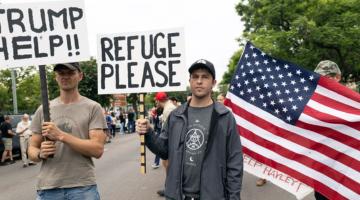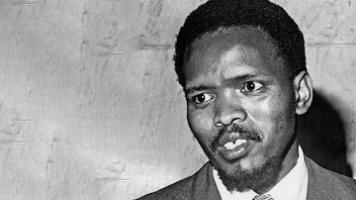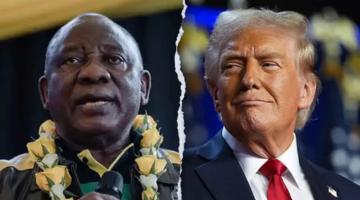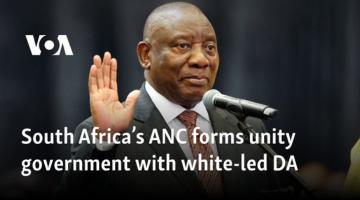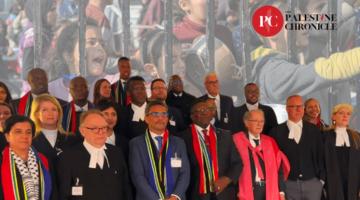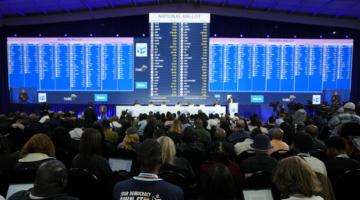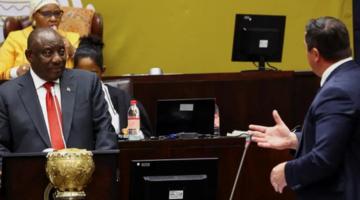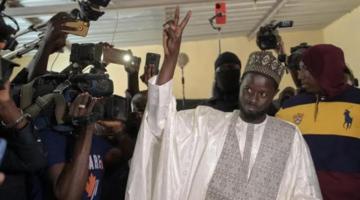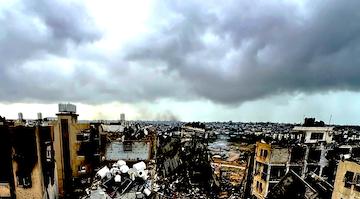Robert Sobukwe, first President of the Pan African Congress of Azania.
The Pan African Congress of Azania’s 1959 Manifesto provides a radical blueprint for African self-determination.
In thinking about the South African peoples’ fight against the apartheid, the history of the Pan African Congress (PAC) gets short shrift. In fact, it is probable that many people, especially the younger generation, do not know the history and significance of the PAC. The Pan African Congress of South Africa - later, the Pan African Congress of Azania - was formed on April 6, 1959 with a leadership that included Robert Mangaliso Sobukwe as President, and Potlake Kitchener Leballo as Secretary. The PAC consisted of a group of younger activists who broke away from the African National Congress (ANC) over stark ideological differences. These activists, known as “Africanists,” rejected collaboration with the white oppressors and agitated for an African-led Black liberation movement. They argued a new society had to be based on African self-determination as Africans were (and are) the majority of the population and the laboring base of the nation.
The PAC felt betrayed by the ANC leadership. They called the ANC elite a “captured black leadership.” This was clear in the ANC’s adoption of a conciliatory “Freedom Charter” which the PAC argued was premised on the principle of “multiculturalism,” the principle that South Africa belongs equally to all those who live in it. PAC members were adamant that there could be no equality between the oppressed and the oppressor, the slave and the master, the dispossessor and the dispossessed. Moreover, they argued that “multiracialism” was a mechanism to privilege white minority rights.
The PAC’s position was also explicitly Pan-Africanist. It pushed against South African exceptionalism and, echoing Marcus Garvey and George Padmore, advocated instead for a “United States of Africa…as an effective bulwark against the forces of imperialism, colonialism,...and tribalism.” The PAC’s specific objectives were: uniting African people across the continent; fighting to overthrow white domination and implement self-determination; and striving for the establishment of “African Socialist Democracy” based on African peoples’ material conditions. In Sobukwe’s words, “We aim, politically, at government of the Africans by the Africans, for the Africans, with everybody who owes his only loyalty to Africa and who is prepared to accept the democratic rule of an African majority being regarded as an African.” At the center of the praxis of liberation, the PAC argued, was land. Land was the inalienable right of the indigenous African people. Africa was for Africans.
The PAC suffered for its radical position. In its first and most successful campaign on March 21, 1960, the PAC organized a large protest against the pass laws. This protest was a significant turning point in the fight against apartheid. The apartheid regime responded with brute force. In what became known as the Sharpeville Massacre, police in Sharpeville opened fire on the protestors ,killing 69 and injuring 180. Another massacre occurred in Langa, near Capetown. The apartheid regime declared a state of emergency and unleashed a progrom against PAC activists. It banned both the PAC and the ANC, forcing many dissidents into exile. The PAC regrouped while in exile, developing an armed wing (the Poqo, later renamed the Azanian People Liberation Army (APLA)), and continued to struggle for self-determination. But thousands of its members were arrested, detained, imprisoned, and tortured by the apartheid regime. Sobukwe was incarcerated on Robben Island until 1969, and held under house arrest until his death in 1978. Between the repression and the group’s own internal contradictions, the PAC lost force.
Meanwhile, the ANC was invited to the negotiating table with the apartheid regime. It is important to contrast here the position of the celebrated Nelson Mandela with that of Robert Sobukwe on the issue of land. While Sobukwe and the PAC centered land as the basis of African liberation, for South Africa’s ANC president, Mandela, declared, “In our economic policies, there is not a single reference to things like nationalization, and this is not accidental: There is not a single slogan that will connect us with any Marxist ideology.” It is no wonder that, in this “post-apartheid” moment, whites still own 80% of the land.
The PAC is mostly forgotten today, and its radical vision of African self-determination - African people’s control of African land and resources - remains a distant dream. But we are hopeful that one day their vision outlined in their 1959 Pan African Manifesto, adopted at the PAC’s inaugural conference, will be realized.
The 1959 Pan Africanist Manifesto
(Adopted by the Pan African Congress at the inaugural conference, April 5, 1959 at the Orlando Communal Hall, Soweto, South Africa)
PREAMBLE
A. A Chain of Reaction
The significant portion of our social milieu begins with the expansion of the markets founded by the rising commercial capital of Western Europe at the turn of the fifteenth century. Succeeding years witnessed the “discovery” of new lands by the Europeans, the Papal award of the whole of Africa to the Portuguese, increased European slave raids on Africa, denuded Africa of Africans and led to the establishment in the Americas of the greatest mass chattel slavery that the world had ever known. Africa had been successfully robbed of Africans. It was this chattel slavery that contributed substantially to the initiation of the European industrial revolution which in turn resulted in the unleashing of a chain of reaction which culminated in the rape of Africa and the close of the last century.
B. Land Robbery and Political Subjugation
Early European settlement of Africa, especially of its southern tip, was a direct result of the rise of European commercial capital. Wave upon wave of European settlers came to Africa and their penetration of the interior involved the loss of sovereignty by the indigenous peoples and the alienation of more and more portions of their land. With the rise of the industrial capital of Europe and its increased search for raw materials and more markets, the partition of Africa went apace and the doctrine of “effective occupation” was enunciated, a theory calculated to “sugar coat” the bitter pills of land robbery and political subjugation. More and more settlers came into the country, until today there are 5,000,000 Europeans who up to the dawn of African liberation had constituted themselves as a ruling class over the 250,000,000 indigenous peoples. Africans had been successfully robbed of Africa.
C. Established by the Sword
The advent of European imperialism and colonialism to Africa brought in its wake the phenomenon of white domination, whether visible or invisible, which is characterized by the political oppression, economic exploitation and social degradation of the indigenous African masses. Throughout this historical epoch, the age of white domination, whenever the spokesmen or representatives of white domination have sprouted a conscience, they have referred to the phenomenon as the “spread of Western civilization” or “the extension of Christian trusteeship.” The undisguised truth is that White domination has grounded down the status of man and stunted THE NORMAL GROWTH OF THE HUMAN PERSONALITY ON A SCALE UNPRECEDENTED IN HUMAN HISTORY. White domination was established by the sword and is maintained by the sword.
D. Expulsion of Imperialist Exploiters
Significant events of the twentieth century, especially of the latter part of it, have constituted a massive challenge to Herrenvolk Ism, a particular manifestation of imperialism and colonialism. Already European exploiters and oppressors have been dramatically expelled from such countries as Indonesia, India, China, Burma, Vietnam, etc. These are today being systematically routed and forcibly caused to retreat in confusion. The post war world has witnessed the expulsion of the European imperialist exploiters and oppressors from large tracts of Africa and the emergence of no less than nine sovereign and independent African states. We are indeed witnessing a twilight of the tin gods of white domination — a gotterdammerung.
E. Decolonization and Independence
Elsewhere in Africa the progressive forces of African nationalism continue to be locked in mortal combat with the reactionary forces of herrenvolk ism. By the end of the next year the peoples of Togoland, Somaliland, the Cameroons and Nigeria will have achieved freedom. The French policy of ‘association’ is also being rejected in favor of decolonization and independence.
F. The Liquidation of the Forces of Oppression
To the chagrin of the imperialists, the government of Free Algeria is a reality. Tanganyika, Kenya and Uganda are on the verge of obtaining their freedom from British imperialism. Contrary to their traditional policy the Belgian imperialists have been forced to accede, at least in principle, to the African people’s demand for the recognition of their independence in the Congo. The policy of partnership pursued in the Central African Federation has been exposed for what it is: the greatest political fraud of our times.
Even in those massive concentration camps, Angola and Mozambique, the African people have begun to reject the status quo in favor of their own freedom. The liquidation of the forces of oppression is a process that not even nuclear power can halt.
G. Right to Shape Own Destiny
The days of European domination of Africa are numbered. Even in South Africa, the writing is glaringly on the wall for those of our European rulers who can see and decipher it. For exactly three hundred and seven years today, the African people have been criminally oppressed, ruthlessly exploited ~ and inhumanely degraded. They have in the past; as they do now, declared themselves for freedom. They reject white domination in any shape or form. They are unflinchingly determined to wrest the control of their country from alien hands. They are determined to exercise the most fundamental of human rights, the inalienable right of indigenous people to determine and shape their own destiny. To the African people there can be no room in any way or in any part of Africa for any non- indigenous peoples who deny to the indigenous populations their fundamental right to control their own material and spiritual interests effectively. South Africa, which is an integral part of the continent, is the inalienable heritage of the African people and its effective control is their undoubted and unquestionable birthright.
H. No Longer With the Ranks of the Liberation Movement
Following the ‘Capture’ of a portion of the black leadership of South Africa by a section of the leadership of the white ruling class, the masses of our people are in extreme danger of being deceived into losing sight of the objectives of our struggle. This captured black leadership claims to be fighting for freedom when in truth it is fighting to perpetuate the tutelage of the African people. It is tooth and nail against the Africans gaining the effective control of their own country. It is fighting for the maintenance of the status quo. It is fighting for the “constitutional guarantees” or “national rights” for our alien nationals.
It has completely abandoned the objective of freedom. It has joined the ranks of the reactionary forces. It is no longer within the ranks of the liberation movement.
I. White Domination Without Frills and Trappings
These “leaders” consider South Africa and its wealth to belong to all who live in it, the alien dispossessors and the indigenous dispossessed, the alien robbers and their indigenous victims. They regard as equals the foreign master and his indigenous slave, the white exploiter and the African exploited, the foreign oppressor and the indigenous oppressed. They regard as brothers the subject Africans and their European overlords. They are too incredibly naive and too fantastically unrealistic to see that the interests of the subject peoples who are criminally oppressed, ruthlessly exploited and inhumanly degraded, are in sharp conflict and in pointed contradiction with those of the white ruling class. Citizen Toussant once remarked that: “Whenever anybody, be he white or mulatoo, wants a dirty job done, he always gets a blackman to do it.” The so-called leaders after doing a dirty job, namely, seeing to it that the African is deprived for all time of his inherent right to control his country effectively; of seeing to it that whatever new social order is established in this country, the essentials of white domination are retained, even though its frills and trappings may be ripped off. This attitude has been labelled MULTI-RACIALISM by their white masters. They have even boldly suggested that being a multi-racialist is a virtue!
J. One Race: The Human Race
The African people are very much proud of their race – the human race. They recognize no inescapable fundamental differences among members of even the three main branches of that race: the Caucasoids, Mongoloids and Afrinoids.
They do not subscribe to the theory that there are inherent mental, emotional and psychological differences among the members of the different branches of the human species. They hold the granting of “rights” on the basis of ethnological origin to be the entrenching of sectional arrogance and the continued maintenance of contempt for human worth and disregard for human dignity.
They regard the differences that exist among various groups or subgroups of man to be mainly acquitted in and through the individual factors in the acquisition of group characters. They do not, and will not tolerate or foster sectional arrogance, and continued contempt for the worth of the human personality and the disregard for human dignity. The African people are fully aware that suggestions of apartheid, whether total or partial, of segregation, social or political, of Christian trusteeship, white leadership with justice, of partnership, etc., are all intended merely as a cloak for their continued oppression, exploitation and degradation. They deny the foreigners any right to Balkanize or Pakistanize their country. To any such schemes, programmes or policies, the African people cannot be a party. The African people are neither racists nor racialists, and they unreservedly condemn all forms of racialism including multi-racialism. They do not nurse any crude hatred for the European peoples, but they do cherish a deep-seated detestation for the Herrenvolk system.
K. Monolithic Giant-Union of African States
The African people of South Africa recognize themselves as part of one African nation, stretching from Cape to Cairo, Madagascar to Morocco, and pledge themselves to strive and work ceaselessly to find organizational expression for this nation in a merger of free, independent African states; a United States of Africa, which will serve as an effective bulwark against the forces of imperialism, colonialism, herrenvolkism and tribalism, and as a sure and lasting foundation for an Africanistic Socialist democracy. The African people regard the development of such a nation as essential for the preservation of their sovereignty, of their vital material and spiritual interests and for the creation of conditions under which they will be enabled to make their lasting contribution to human advancement in a free Africa.
The African people will not tolerate the existence of the other national groups within the confines of one nation. For the healthy growth and development of the African nation, it is imperative that all individuals must owe their first, and only loyalty to the African nation, and not to their ethnic or national groups, The African people regard the influence of material conditions in the development of a nation as being of greater significance than mere ethnic origin. Within the social environment of the African nation there will be room for all individuals who identify themselves materially, intellectually and spiritually with the African nation.
In South Africa, the social force which upholds the material, intellectual and spiritual interests of the oppressed peoples is African nationalism, and the social force which upholds the material, intellectual and spiritual interests of the oppressor is Herrenvolkism. These antithetical forces shall find their final reconciliation everlasting in the synthesis of Africanism, in which the contrary aspects shall have vanished and only the unifying factors which portray no instability shall remain. Africanism is a social force that upholds the material, intellectual and spiritual interests of the individual. In this way, Africanism is the only logical and practical solution for the social question in Africa.
L. Social Relations
The basic question confronting the African people is identical with that which has faced mankind from the beginning of time itself: the problem of man’s relation to his fellowman. It is the question of how man shall live with his fellowman in fellowship, in harmony and in peace.
Man moves and has his being in a social environment. In the absence of social life the economic question would fall away. Man’s relation to his fellowman is determined by his primary needs. The social question, whose structural foundations are to be found in economic determinism, arises within the framework of social relations.
Man is, therefore, a social being and not an economic ANIMAL. To live in harmony with his fellowmen, man must recognize the primacy of the material and spiritual interests of his fellowmen, and must eliminate the tendency on his part to uphold his own interests at the expense of those of his fellowmen. It is only within such a set-up that the human personality can be developed and that respect for it can be fostered.
M. Our Historic Tasks
The historic tasks of the African liberation movement are clearly the product of Africa’s history, of the forces and factors which have made it what it is. To attain complete freedom in Africa, the historic tasks of the movement are:
To forge, foster and consolidate the bonds of African nationhood on a Pan-African basis.
To implement effectively the fundamental principle that the dominion or sovereignty over and the dominion or ownership in the whole territory of the continent rest exclusively and inalienably in the indigenous people.
To create and maintain a United States of Africa that will serve and provide a concrete institutional form for the African nation.
To establish an Africanistic Socialist democratic social order, recognizing the primacy of the vital material, intellectual, and spiritual interests of the individual.
A liberation movement must find concrete expression in organizational form and substance in order that it may achieve its historic tasks. The highest organizational form and structure in which the African liberation movement has found concrete expression in South Africa is the Pan Africanist Congress and the various facets of its historic role are:
To create an organizational machinery for the galvanizing of the oppressed, exploited and degraded African masses into an irresistible social force bent upon the destruction of all factors and forces that have reduced the stature of man and retarded his growth; and also bent upon the creation of conditions favorable for the restoration of man’s worth and dignity and for the development of the African personality.
To establish for the liberation movement a training ground for the production of a determined, dedicated and disciplined collective leadership that will serve, not only as the symbol of national unity on a Pan African basis, but also as the repository, guardian and custodian of the ideas, principles and methods of the movement, as well as of the policies and programmes of the organization.
To provide an administrative machinery for the direction, guidance and control of the national liberation movement in its grand march towards the inevitable goal of complete freedom.
N. Africanism – A Third Social Force
Africanism is Pan Africanistic in scope, purpose and direction. It is a social force that constitutes the third social force in the world. It serves the material, intellectual spiritual interests of Africa, and does not in any way serve the spiritual interests of either the Eastern or the Western powers. It is continental in scope, covering the entire continent, from Cape to Cairo and from Madagascar to Morocco. It is a social force functioning through the media of African social conditions, and operating to liberate Africa and to create a social order original in conception, Africanist in orientation, socialistic in content, democratic in form and creative in purpose. Pan Africanism became a concrete reality when African nationalists from all parts of the continent met at Accra. The All Africa People’s Conference, held in Accra in December 1958 laid a promising organizational foundation for African nationalism on a Pan African basis.
O. Final Triumph
In its dialectical march towards the final synthesis of Africanism, African nationalism is destined to create the conditions favorable for the development of the African personality.
The final triumph of the liberation movement under the direction of the P.A.C. is assured. The movement must triumph because in their march to freedom the African people have history on their side. The militant progressive forces of African nationalism are bound to crush the reactionary forces of white domination. The movement must triumph because the P.A.C. alone has a message for the oppressed, that their salvation lies in manifest determination to unite as a nation and to struggle for the noble ends of freedom and self-determination. The movement must triumph because, having been purified in the crucible of oppression, the African people can demonstrate to the world genuine democracy in action, a democracy founded upon the ruins of the material and spiritual conflicts and contradictions of the existing social order, a democracy in which man shall at long last find his true self, and a democracy in which the human personality shall blossom to the full.
ADOPTED BY THE INAUGURAL CONFERENCE OF THE P.A.C. 5th APRIL, 1959

